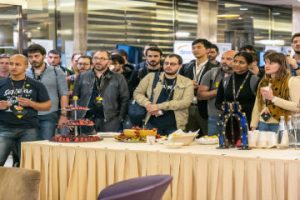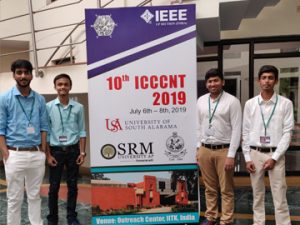Dr. Thondamal to set up joint biological research facility at leading national lab in Hyderabad
May, 2019: Following discussions between SRM APs Biology research team (initiated by SRM AP Pro VC Prof. Narayana Rao and Dr. S. Chandrasekhar, Director CSIR-IICT, Hyderabad) and the Applied Biology division of CSIR-IICT, Dr. Manjunatha Thondamal, Assistant Professor, Department of Biological Sciences at SRM AP, was invited to establish a C. elegans facility at IICT campus and train the scientists/students.
- Published in News, Research News
“Hearing Colours and Seeing Sounds” – SRM AP student’s paper on Python programming applauded at prestigious international conference.
 PyCon X Italy, May 2019: Aakanksha Chouhan, 2nd Year CSE student and member of Minsky group at Next Tech Lab gave an invited talk at PyCon X Italia in Florence, Italy. She was the youngest invited and funded speaker at the International conference on Python programming and its applications.
PyCon X Italy, May 2019: Aakanksha Chouhan, 2nd Year CSE student and member of Minsky group at Next Tech Lab gave an invited talk at PyCon X Italia in Florence, Italy. She was the youngest invited and funded speaker at the International conference on Python programming and its applications.
Aakanksha elaborated on her research at Next Tech Lab on better understanding Synesthesia using Artificial Intelligence. Her work in deep learning led her to exploring creative applications of AI. Aakanksha’s talk was attended by over 400 people and was well received by the community.

PyCon Italia is attended by thousands of experienced programmers, computer scientists and industry veterans looking to hire top talent in Italy. The conference was sponsored by industry leaders like Python Software Foundation, Intel, and IBM.
The event was held at the Grand Hotel Mediterraneo and hosted several speakers from around the world for the 4 day multi-track conference.
https://www.pycon.it/conference/talks/hearing-colours-and-seeing-sounds-using-python
- Published in News
Dr. Tewari receives Homi Bhabha National Institute’s Outstanding Doctoral Student Award
Dr. Somesh Vinayak Tewari, Assistant Professor, Department of Electrical and Electronics Engineering (SRM University AP) was awarded the prestigious “Outstanding Doctoral Students Award”, from Homi Bhabha National Institute (HBNI) at an event held at the Department of Atomic Energy (DAE) Convention Centre, Anushaktinagar, Mumbai. Dr. Tewari was presented this award for his PhD thesis titled “Study of surface flashover of insulator in gases at high pressure.”
- Published in Departmental News, EEE NEWS, News
Next Tech Lab undergraduates present ‘Smart Irrigation Solution for Farmers’ at the 10th ICCCNT at IIT Kanpur
 July 6th-8th, 2019: Second and third year B.Tech students, Agniswar Paul – ECE 3rd year, Fahad Kamraan – CSE 3rd year, Ajay Kumar – CSE 2nd year, Jaideep Cherukuri – CSE 2nd year, together presented a paper on “Low-cost IoT+Machine Learning (ML) design for smart farming using multiple applications” at the 10th ICCCNT held at IIT Kanpur. The model developed is a breakthrough in the context of Indian agriculture, providing smart irrigation solutions, based on weather forecasts. This cost-effective, ML infused technology (alert system for farmers) will help improve the yield through crop suggestion and weather determination.
July 6th-8th, 2019: Second and third year B.Tech students, Agniswar Paul – ECE 3rd year, Fahad Kamraan – CSE 3rd year, Ajay Kumar – CSE 2nd year, Jaideep Cherukuri – CSE 2nd year, together presented a paper on “Low-cost IoT+Machine Learning (ML) design for smart farming using multiple applications” at the 10th ICCCNT held at IIT Kanpur. The model developed is a breakthrough in the context of Indian agriculture, providing smart irrigation solutions, based on weather forecasts. This cost-effective, ML infused technology (alert system for farmers) will help improve the yield through crop suggestion and weather determination.
- Published in News

